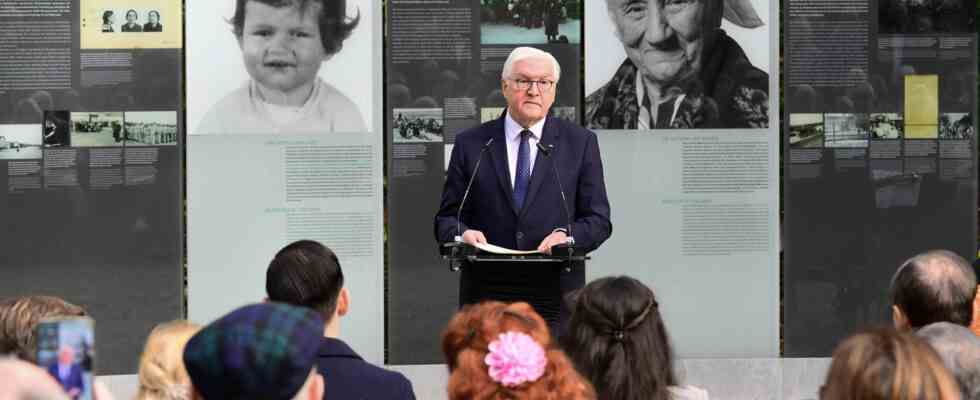Status: 10/24/2022 12:53 p.m
The Federal President honored the memorial for Sinti and Roma in Berlin – on the tenth anniversary of the building. The everyday discrimination against Roma must stop, said Steinmeier.
Federal President Frank-Walter Steinmeier has criticized ongoing discrimination against Roma in Germany and Europe. According to Steinmeier in Berlin, the old anti-Roma prejudices persisted in many parts of society. They would be revived all over Europe by radical right-wing forces. “The everyday discrimination against Roma and Romnja must stop,” he said.
In Germany, too, Roma are discriminated against in public spaces, at school, on the job market, in the police force and in public authorities. To this day, many have kept their origins, language and culture a secret for fear of humiliation or hostilities. Nobody in the country should be indifferent to this. In Germany too, members of the minority are increasingly becoming victims of racially motivated hatred and brutal violence, for example in the attack in Hanau in 2020.
“We must not allow fears and worries in society to be used to stir up hatred against minorities,” said Steinmeier. “That, too, is part of our country’s special historical responsibility.”
Steinmeier spoke at a ceremony marking the tenth anniversary of the memorial to the Sinti and Roma murdered under National Socialism. The complex near the Reichstag building and the Brandenburg Gate consists of a large basin with a stone on which a fresh flower is placed every day. The memorial was officially expanded today to include an outdoor exhibition. It consists of nine panels that tell the stories of persecuted Roma.
Steinmeier: “Immeasurable injustice”
Steinmeier again asked for forgiveness “for the immeasurable injustice done to the Roma of Europe by Germans during the National Socialist period”. They were disenfranchised and excluded, excluded from schooling, expelled from their jobs, forced to give up their trades, forbidden to marry, declared stateless, measured and classified.
Steinmeier also recalled “the disregard that German Sinti and Roma experienced in the Federal Republic after the end of the war”. Many survivors felt that this was a “second persecution”. And it took far too long for the crimes committed against the Roma to be recognized as genocide. “For many, compensation came too late.”
Telling the stories of the victims
With the memorial located between the Brandenburg Gate and the Reichstag building, Germany acknowledges its responsibility to keep alive the memory of the genocide of the European Roma. “We must not forget, because what happened then must never happen again,” said the Federal President.
It must be ensured “that the stories of the victims remain alive – even if there are no survivors who can tell them to us”. Above all, ways had to be found “to let young people discover what these stories have to do with them and their world today,” said Steinmeier.
About half a million Sinti and Roma were murdered
The memorial commemorates the approximately 500,000 Sinti and Roma murdered by the National Socialists between 1933 and 1945. The members of the minority were systematically persecuted and taken to concentration camps, killed or used in human experiments.
In 1982 the then Federal Chancellor Helmut Schmidt called this genocide, and in 1992 the federal government decided to erect a national memorial to commemorate the murder of these persecuted people. 20 years later, it opened on October 24, 2012.
According to estimates, around 70,000 to 150,000 Sinti and Roma live in Germany today.

